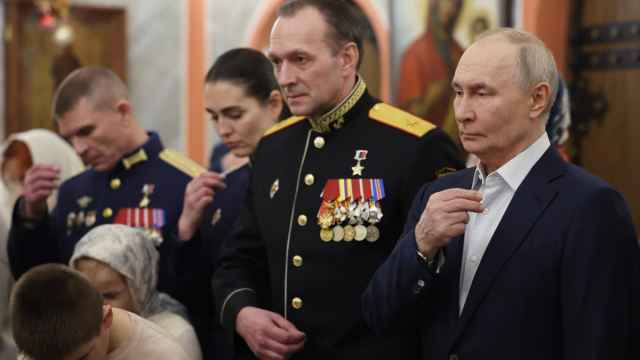WASHINGTON — Russian and Israeli tourists can now travel visa-free between their two countries, yet U.S.-Russian trade relations continue to be stymied by a Cold War law censuring the Soviets for holding up Jewish emigration.
In 1974, Senator Henry Jackson and Representative Charles Vanik attached a provision to a trade bill denying normal trade relations to communist states that restrict emigration or punish those seeking to leave the country. In the following years, the Jackson-Vanik amendment was a major factor in compelling Moscow to allow more Jews to emigrate.
It lost much of its relevancy after the Soviet collapse, and since 1994 U.S. presidents have annually waived its application in extending normal trade relations to Russia.
But the amendment remains on the books and now poses a threat to U.S. businesses in danger of losing greater access to the Russian market if Congress doesn't repeal the measure. Republicans say they're not going to allow that until President Barack Obama's administration submits pending free-trade agreements with Colombia and Panama to Congress.
Russia is working to wrap up negotiations in the coming months on entry into the World Trade Organization. If it succeeds, the United States would have to lift the Jackson-Vanik law and grant Russia permanent normal trade relations to gain more unfettered access for American companies to Russian markets.
Congress must act "to avoid putting U.S. companies at a disadvantage in the world's 10th-largest economy," said Edward Verona, president of the U.S.-Russia Business Council.
Vice President Joe Biden, in a trip to Moscow last month, said lifting Jackson-Vanik would both create new jobs in the United States and help strengthen relations with Russia. He lamented that the value of goods that cross the U.S. borders with Canada and Mexico every few days exceeds annual U.S. trade with Russia.
Mark Levin, executive director of the National Conference on Soviet Jewry, said at a House Foreign Affairs Committee hearing last year that his group supports "graduating" Russia from Jackson-Vanik. Russia needs to do more in such areas as human rights and hate crimes, he said, but "now we think it is time to move forward and recognize the profound changes for the better that have taken place in Russia and in Russia's Jewish community."
Congress has lifted Jackson-Vanik for several former Soviet states, most recently Armenia in 2005 and Ukraine in 2006. But the amendment still applies to eight others, including Russia, Kazakhstan, Azerbaijan and Moldova. There's no guarantee that Congress will address the issue this year.
Republicans are demanding that the Obama administration send three pending free-trade agreements — with South Korea, Colombia and Panama — to Congress for ratification. The administration says Colombia and Panama aren't quite ready, prompting Republicans to declare that they won't act on any trade matters, not a pending trade accord with South Korea and certainly not with Russia, until the Colombia and Panama accords are submitted.
Congress is ready to work with the White House, when the time is right, to make Russia part of the rule-based trading community, said Kevin Brady, Republican chairman of the House Ways and Means trade subcommittee. But "none of that will occur until we have successfully moved the three pending free-trade agreements."
Even with action on the three trade deals, ending Jackson-Vanik and extending permanent normal trade relations to Russia will be no easy sell. There's concern on both sides of the aisle about Russia's backsliding on democracy, its poor human rights record and its lack of cooperation on Iran. Economically there is anger over Russian curbs on U.S. poultry and other meat imports and its poor enforcement of intellectual property rights.
Improvement in those two economic areas are needed "to give Congress the confidence that Russia can and will live up to its commitments," Brady said.
At a recent Senate Finance Committee hearing, U.S. Trade Representative Ron Kirk said he would work with Congress this year to grant Russia permanent normal trade relations. Senators demanded guarantees that Russia would not be like China, which was given permanent trade status in 1999 but continues to violate U.S. intellectual property rights.
At question is whether Jackson-Vanik serves any purpose in steering Russia toward becoming a better trading partner. The U.S.-Russia Business Council's Verona maintains that it is no longer relevant to political and social realities in Russia.
Instead, "it remains an irritant" in U.S.-Russian relations, Verona said. "Many Russians see the unfulfilled promises of the past three U.S. administrations to lift the amendment as evidence of bad faith on our part."
A Message from The Moscow Times:
Dear readers,
We are facing unprecedented challenges. Russia's Prosecutor General's Office has designated The Moscow Times as an "undesirable" organization, criminalizing our work and putting our staff at risk of prosecution. This follows our earlier unjust labeling as a "foreign agent."
These actions are direct attempts to silence independent journalism in Russia. The authorities claim our work "discredits the decisions of the Russian leadership." We see things differently: we strive to provide accurate, unbiased reporting on Russia.
We, the journalists of The Moscow Times, refuse to be silenced. But to continue our work, we need your help.
Your support, no matter how small, makes a world of difference. If you can, please support us monthly starting from just $2. It's quick to set up, and every contribution makes a significant impact.
By supporting The Moscow Times, you're defending open, independent journalism in the face of repression. Thank you for standing with us.
Remind me later.





